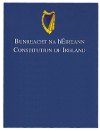On Wednesday the Minister for Children, Frances Fitzgerald, in the course of reiterating the Government’s  committment to holding a children’s rights referendum confirmed that the referendum wording would include a reference to a child’s ‘best interests’, and would ensure that children are treated as citizens.
committment to holding a children’s rights referendum confirmed that the referendum wording would include a reference to a child’s ‘best interests’, and would ensure that children are treated as citizens.
What she neglected to mention is that Irish law actually contains reference to the ‘best interest’ of children, or that the Constitution already treats children as citizens.
Speaking on RTE’s News At One, she said that the referendum would ask people , “do you you believe we should consider the very best interests of the child when decisions are being taken about that child?”
However, although it is not to be found in the Constitution, the 1989 Children Act, the 1991 Child Care Act, and the 1997 Children Act all make clear that the courts are under an obligation to consider the ‘best interests’ of the child in proceedings involving children.
The Minister’s suggestion that a referendum is needed to ensure that children are not currently treated as citizens is at least as puzzling.
Supporters of a children’s referendum have repeatedly suggested that such a vote would be about “giving rights to children.
But while this might make for a good rhetorical flourish, it is a bogus argument which has been rebutted by a series of legal experts.
Most recently, Dr Oran Doyle of Trinity College has thoroughly debunked it.
Writing in the Irish Times in February, he said: “The first cause for concern is that the promotion of a children?’s rights amendment may lead people to believe that children’s rights are not protected by the Constitution. This is incorrect. Generalising somewhat, we can say that children have the same personhood rights as adults (eg, the right to bodily integrity).
“Children do not have the same political process rights as adults (eg, the right to vote). Children have, however, a number of age-limited positive rights that are not held by adults (eg, the right to a free primary education).”
Gerard Hogan, at the time a law lecturer with Trinity but now a High Court judge also found fault with the suggestion that the current Constitution did not defend children’s rights.
In a 2010 interview on RTE Radio he said, “the suggestion that the present provisions haven’t worked well, or that they don’t strike the right balance, or are in some way responsible for lots of modern ills” was “a grotesque misstatement and misunderstanding of the present Constitutional provision”.
And Supreme Court judge, Justice Adrian Hardiman, in the Baby Ann case in 2006, utterly rejected the suggestion that the Constitution did not protect the rights of children.
It would be, he said, “quite untrue to say that the Constitution puts the rights of parents first and those of children second.”
The Constitution, he insisted, fully acknowledged “the natural and imprescriptible rights and the human dignity, of children, but recognised “the inescapable fact that a young child cannot exercise his or her own rights.”
Justice Hardiman added: “The preference the Constitution gives is this: it prefers parents to third parties, official or private, priest or social worker, as the enablers and guardians of the child’s rights.”
The real issue of this referendum is not about giving children rights; the Constitution already does that. The issue is where to set the threshold for State intervention in the family in order to protect children from abuse and neglect.
Currently, the Constitution sets a very high threshold, and the Government, and many of those in children’s charities think it is too high. That is arguable. What is not arguable is that the Constitution already treats children as citizens and that Irish law already has regards to children’s ‘best interests’.















